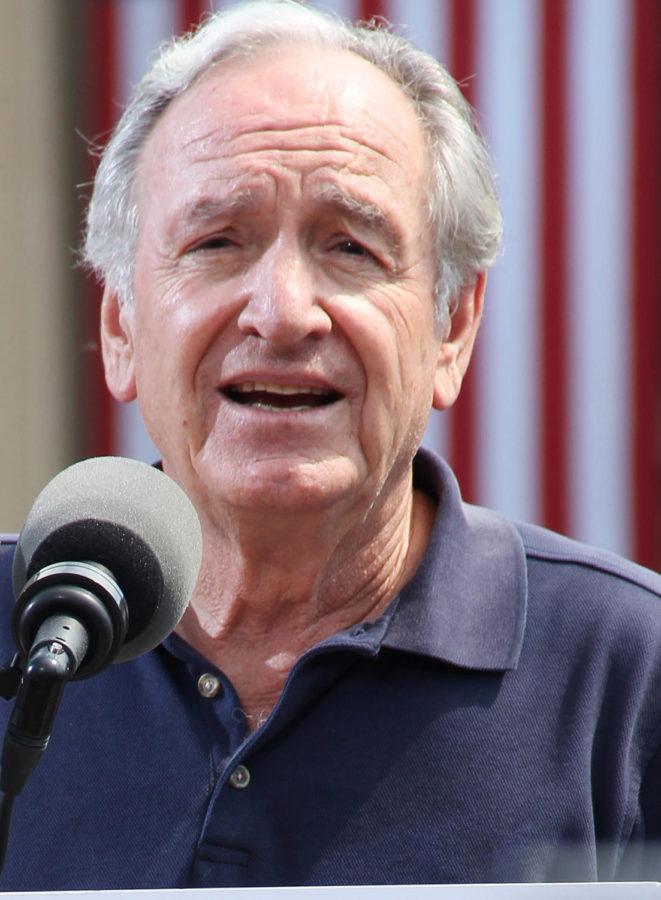Harkin refuses to pass papers
February 7, 2013
Iowa Democratic Sen. Tom Harkin has decided not to release his congressional papers to the Harkin Institute of Public Policy at Iowa State.
Harkin’s Feb. 5 letter to President Steven Leath declared his denying of his papers to the university. In the letter, Harkin expressed concerns that the university wasn’t granting the Institute complete academic freedom to research any area.
A statement from the letter claims the university “intended to restrict some areas of research, constrain some activities and subject some areas of inquiry at the Harkin Institute…”
This idea may have stemmed off of a September 2011 memo saying that the Institute was banned from performing agricultural research in fear of duplicating any research done by the Center of Agricultural and Rural Development.
After the board voiced concern, however, the ban was uplifted.
Two advisory board members, Michael Gartner, regent, and Ruth Harkin, the senator’s wife, opposed the full ban and made clear that they would do the same for any further research restrictions.
This sparked discussions that would eventually lead the Advisory Board to recommend to Harkin that he not contribute his papers to the university.
The board was mentioned in Harkin’s letter to Leath saying “The Harkin Institute’s Advisory Board has informed me they think these proposals have damaged the institute to such an extent that it would never be able to flourish at Iowa State.”
David Peterson, director of the Harkin Institute and professor of political science, said otherwise.
“They saw something that wasn’t there,” Peterson said. “They saw a limit on the opportunities of faculty members or limits on access to Sen. Harkin’s papers. This was never the case.”
The advisory board’s vote on whether or not to recommend to Harkin that he withhold his papers from the university took place via teleconference by roll call vote. Of the eight board members, five voted yes to detain the papers, two abstained to vote and one voted against the recommendation.
The institute is a part of the College of Liberal Arts and Sciences. Beate Schmittmann, the dean of LAS, voted to release the papers.
“I feel the institute is free to pursue research on campus. If the papers had come to campus, they would have been openly available to faculty to research,” Schmittmann said. “Being the one person on the advisory board who is really from within the university engaged in the daily business with the university [was] probably why my perspective on the situation was different.”
In an interview with the Des Moines Register, Leath stated he had never heard any complaints of academic restriction. Leath, at one point, nearly granted full reign on research as long as the institute worked cooperatively with the rest of the university.
“There were no limits on the papers. There was direction for the institute,” Peterson said. “That’s the reality of how a university operates. So this idea of they are somehow restricting academic freedom or that there were going to be limits on the use of the papers is entirely a red herring.”
Leath’s response stated that the criticism is “unfounded and false.” Restrictions were uplifted in Leath’s Jan. 2 guideline for research.
The Harkin Institute’s approval for establishment was granted by the Iowa Board of Regents in April 2011 to, according to the website, “serve as the catalyst for interdisciplinary research, teaching and outreach on vital public policy issues.”
The Institute was named after Harkin, a 1962 ISU graduate, for his nearly 40 years of public service in the U.S. House of Representatives and Senate.
The website states: “The Institute will house Senator Harkin’s papers.”
The $3.3 million made in donations to the Institute under the assumption that the papers would be held there may need to be returned to the donors. The ISU Foundation will be discussing this soon.
As for the future of the institution on campus, the possibility of running it under a different name has been discussed.
Leath, in an interview with the Des Moines Register, said this will be a concern for the next couple of months.
Details on what Harkin’s papers actually entail are vague. Peterson said the papers were to be managed by the library; the only restrictions on access to them would be the library’s closing hours.
“As far as I know, contents of the papers were between Sen. Harkin and the library,” Peterson said.
The loss of the papers is a disappointment to many at Iowa State. Nearly 40 years of U.S. House and Senate insight could have been very beneficial to the university.
“I think, had the papers come here, we have some outstanding faculty members who would have done some outstanding research with the papers,” said Schmittmann. “[This] could have brought national attention the university.”







